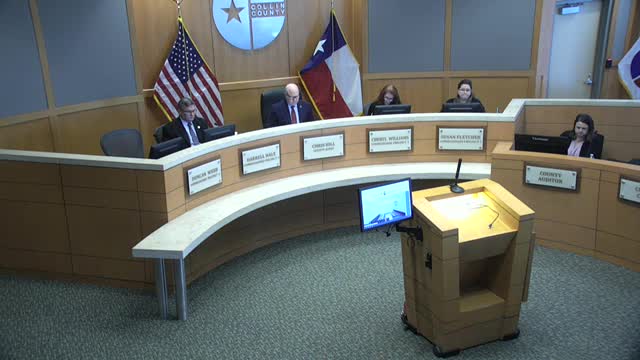Collin County staff outline state bills that could create unfunded local mandates
Get AI-powered insights, summaries, and transcripts
Subscribe
Summary
County staff warned commissioners about a slate of Texas bills — including measures on senior justice centers, judicial discipline, prisoner reimbursements and food-truck permitting — that either could saddle Collin County with new costs or change local authority if passed.
Collin County Deputy County Administrator Russell Schumpeter told the Collin County Commissioner's Court that staff are tracking multiple pieces of legislation this session that could affect county operations and finances.
"This is an unfunded mandate that would require a county with a population of a million or more to set up a senior justice assessment center," Schumpeter said, describing Senate Bill 160 by Menendez. He also summarized bills he said would expand state authority over judicial discipline, change reimbursement responsibilities for out-of-county inmates, adjust juvenile detention reimbursements and alter magistration procedures.
The update, presented during the court's general discussion on the meeting agenda, flagged several bills by number. Schumpeter said Senate Bill 293 would expand the State Commission on Judicial Conduct's authority and described a proposal that would increase a district judge's salary by $21,000 (described in the packet as "from 140 to 161"). He described Senate Bill 297 (by Perry) as one that could require counties to reimburse for attorneys or pay for confidential communication costs when defendants are housed 50 miles or more outside the county. He said Senate Bill 468 would require compensation to counties when the Texas Juvenile Justice Division holds defendants beyond 30 days. Schumpeter also mentioned a comprehensive magistration bill, SB 664, and House Bill 1449 (Capriglione), which would expand a prior pilot allowing county-issued food-truck permits that operate across cities to all counties with populations of 1 million or more.
Commissioners discussed tracking and responding to bills they consider detrimental or unfunded. One commissioner asked that staff "keep an ear to the ground" on possible changes to extraterritorial jurisdiction (ETJ) and on legislation affecting fire districts. Commissioner Williams said the county and the Regional Transportation Council would watch related proposals in Austin.
Schumpeter told the court staff would keep the list updated weekly and asked commissioners to notify staff of additional bills they want tracked. The court did not take formal votes on the bills during the meeting; the discussion was described as a briefing and an opportunity for the public and commissioners to see which items staff are monitoring.
The packet and Schumpeter's remarks emphasized counties with populations of one million or more as the threshold for some measures and repeatedly characterized several of the bills as potential unfunded mandates or changes that could complicate Collin County's current administrative structures.
Staff and commissioners agreed to continue weekly updates during session so the court and the public can track movement on bills that potentially affect county operations and budgets.
